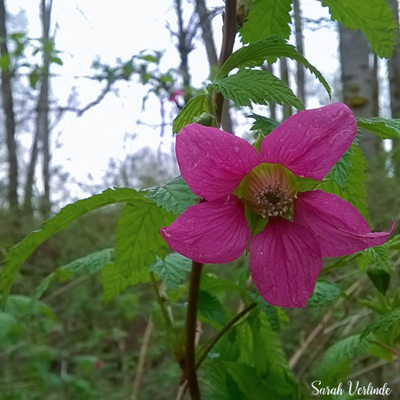Salmonberry
Rubus spectabilis – Salmonberry
At a Glance:

- Family: Rosaceae
- Plant Type: Erect deciduous shrub
- Distribution: Pacific Coast, California to Alaska
- Habitat: Moist woods and wetland buffers, at low to mid elevations
- Height: 9 feet
- Flower/Fruits: Hot pink flowers with a yellow/green center, fruit ripens to a sweet orange-red “berry”, similar to a raspberry.
- Flowering Season: March – June
- Leaves: Large compound three part leaf. If you cover the top/middle leaflet, the two lower ones make the shape of a butterfly.
- Generation: Perennial
- Bark: Brown flaking/peeling bark
- Notable feature: These plants are easy to spot when the flowers emerge early in spring, before leafing out completely.
Restoration and Conservation
Salmonberry is a great plant to use in restoration which is fairly easy to grow and supports wildlife. The flowers are an early source of nectar for over-wintering local hummingbirds, bees, butterflies, and other insects. The berries support birds, bears, and small mammals. Leaves and twigs are grazed on by deer, elk and rabbits, and the dense, prickly stems provide a thicket habitat for small birds and mammals to shelter in.
Ethnobotany
The berries are edible and delicious and are a staple food in many Native American diets along the Pacific Coast. *Don’t eat the berries on campus or along roadsides due to possible contamination.* Young stems could be harvested and served like asparagus. As a medicine, salmonberry leaves and bark were used for many purposes including treating diarrhea or dressing burns and sores on the skin.
References and Resources
- NRCS/USDA: https://www.nrcs.usda.gov/Internet/FSE_PLANTMATERIALS/publications/orpmcpg10952.pdf
- US Forest Service: https://www.fs.fed.us/wildflowers/plant-of-the-week/rubus_spectabilis.shtml
- WTU Image Herbarium: http://biology.burke.washington.edu/herbarium/imagecollection/taxon.php?Taxon=Rubus%20spectabilis
This article was written by Sarah Verlinde. For questions regarding the UWB/CC Plant Tour, contact Sarah at severlin@uw.edu.
